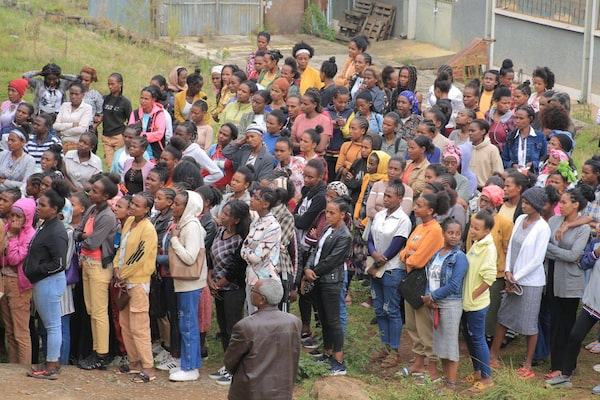
A large crowd of women arrive to register for recruitment at a government centre in the town of Durame of Ethiopia's SNNPR region, 367 km south of Addis Ababa.Supplied
On a hidden cellphone from her place of detention, Ethiopian domestic worker Fikirte recounts her harrowing ordeal. Flown from Ethiopia to Saudi Arabia, she toiled for weeks for a married Saudi couple, cleaning floors and evading the man’s advances, until she fainted from hunger and exhaustion.
Her employers sent her back, unpaid, to a recruitment agency in Riyadh, complaining that she was too weak for the job. The agency confined her in a locked room with other foreign workers and confiscated their passports and cellphones as it awaited new assignments for them.
Fikirte, a 31-year-old from northern Ethiopia with an infant son, had placed her trust in a government advertisement that she saw on Facebook this year, enticing women to Saudi Arabia under a scheme to export 500,000 Ethiopian women for domestic work in the oil-rich kingdom.
Human rights researchers have condemned the program, citing dangerous working conditions, exploitation and rampant abuse of migrant workers in Saudi Arabia, which largely go unpunished. About 10,000 migrant workers from southeast Asia alone are estimated to die annually on average across the Gulf countries.
Despite these warnings, the Ethiopian government sees financial advantages to the migrant-worker program. After years of civil war that has left hundreds of thousands dead, it hopes the migrants will send enough money to their families back home to ease Ethiopia’s severe foreign-currency shortage.
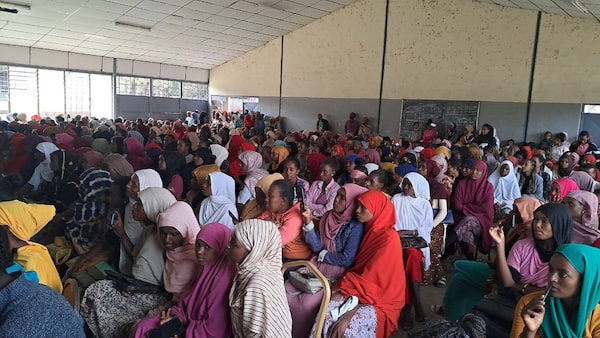
A large group of recruits in the Oromia regional town of Chiro (324 km west of the capital) are lectured about the merits of domestic work in Saudi Arabia, by the West Hararghe Zonal governor, prior to the beginning of their pre-departure training session.Supplied
To attract women like Fikirte, the Ethiopian government is making heavy use of Facebook, promising safe jobs with steady incomes in Saudi Arabia. Data compiled by The Globe and Mail show that since late February, more than 200 Ethiopian state institutions – including government ministries, district administrations and state media – have used their official Facebook pages to promote the Saudi recruitment drive and lure Ethiopian women into registering.
The Globe has identified about 300 recruitment posts on Facebook by a range of Ethiopian state agencies, including dozens of government offices and branches of the ruling party, the Prosperity Party. The posts are often misleading, urging women to capitalize on what is portrayed as a job creation boon by the ruling party. “Congratulations job seekers!” reads an upbeat post by the administration of the town of Bati, portraying the program as the solution to their woes.
The posts make no mention of the fact that migrant workers are denied Saudi Arabia labour law protections and instead have their status regulated by the country’s discriminatory “kafala” or sponsorship system.
The kafala system, often criticized as a cover for modern day slavery, links a worker’s legal residency status to an employer. Migrants are unable to quit their jobs without the consent of their employer, even in cases of extreme abuse.
In response to questions from The Globe, Facebook’s parent company says it is reviewing some of the recruitment posts and will remove any that violate its policies.
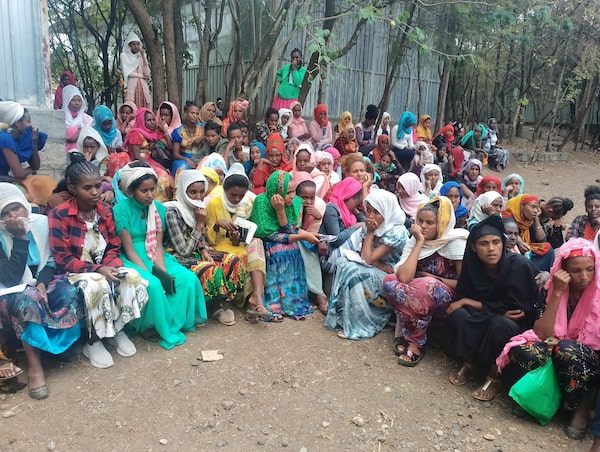
Recruits in the Amhara regional city of Woldia, (700 km north of the capital) attend a pre-departure training session.Supplied
In her hometown, Fikirte registered for the recruitment program after seeing a Facebook advertisement. “I need money if my son is going to have a good life,” Fikirte told The Globe on the hidden cellphone. (The Globe is not disclosing her full name or hometown because she is still in Saudi Arabia and vulnerable to possible reprisals for speaking out.)
She left her son with relatives and enrolled in a state-run training program with about 20 other recruits, where they learned some basic Arabic and how to use cleaning appliances. Then, in June, the government flew her to Saudi Arabia. The recruitment agency placed her in the home of the married couple, where she says she was given little food and had to dodge the husband’s frequent attempts to touch her.
“I can survive the heavy workload, but being hungry all day was too much for me,” she told The Globe in early August. “I was afraid to sleep at night because my room wasn’t locked.”
She feels misled by the Facebook advertising and the government’s assurances of safety. “It’s all a lie. They don’t care about what happens after they get you here. If you want to come, you need to understand the risks and put your faith in God, not them.”
Her description of Saudi recruitment practices is consistent with reports of how Saudi labour brokers run their businesses. Operating as middlemen and connecting domestic workers to jobs across the kingdom, recruitment brokers have a track record of mistreating domestic workers. The risk of spending months locked in their offices isn’t mentioned in any of the Ethiopian government’s promotional Facebook posts.
In Ethiopia, the government considers the program a success. A labour ministry official told local media that 36,000 women had registered by mid-April, after less than two months of the recruitment campaign. The number is likely to be significantly higher now.
Groups helping migrant workers are deeply concerned that Ethiopian state agencies are promoting the Saudi jobs. “This is very worrisome as we are still receiving pleas of assistance from domestic worker abuse victims in Saudi Arabia,” says Ekaterina Porras Sivolobova, director of Do Bold, a non-profit that operates emergency support hotlines for migrant workers in the Middle East.
Migrants who flee their jobs face arrest and deportation, and the system has been linked to deaths and injuries of scores of migrant workers. At least 89 Kenyan domestic workers mysteriously died in Saudi Arabia between 2020 and 2021. Deaths are rarely investigated and are often attributed to cardiac arrest.
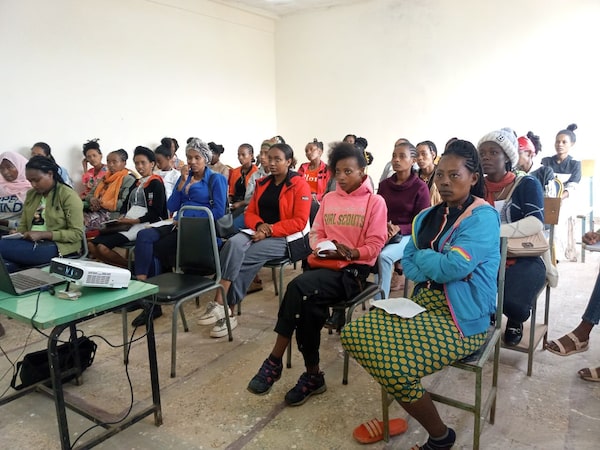
Recruits in the town of Sodo, SNNPR region, (314 km south of the capital) attend a training session being held in a classroom of what is normally the town's college. Beyond simply participating on Facebook, academic institutions are lending their space and facilities for those preparing to send women towards a life under the kafala system.Supplied
In 2021, Saudi Arabia announced amendments to its kafala system, but they don’t include any protections for migrant domestic workers.
Abuse of Ethiopian migrants is common in Saudi Arabia. In a report in August, Human Rights Watch documented a pattern of unprovoked killings, torture and rape by Saudi border guards of unarmed Ethiopian migrants trying to enter the country on foot from war-torn Yemen. Hundreds and possibly thousands of Ethiopian migrants may have died at the borders since March 2022, the report says.
Despite the criticism from rights groups, the Ethiopian government says the recruitment campaign is an improvement on previous programs. “We’re sending trained workers, unlike before,” Muferiat Kamil, who heads Ethiopia’s Ministry of Labour and Skills, said in an April state media broadcast.
“This will diminish the dangers our citizens face in [Saudi Arabia]. We’ve held discussions with Saudi Arabia about previous agreements, and improvements on working conditions and salaries have been made.”
Similar initiatives by Ethiopia’s Labour Ministry dating back to 2015, however, have failed to protect migrants. A recent agreement that it signed in April with the government of Lebanon offered no protections or even a minimum salary for Ethiopian workers.
To assuage fears in Ethiopia, the government has used Facebook to spread misinformation about the Saudi jobs. In April, a Facebook post by the Labour Ministry falsely claimed that Saudi Arabia had agreed to “completely eliminate” the kafala system for Ethiopians.
Authorities in the southern Ethiopian town of Halaba Kulito used their Facebook page to promise salaries of 6,000 Saudi riyals (around $2,200) per month. In reality, domestic workers in Saudi Arabia typically earn around 1,000 riyals ($362) monthly.
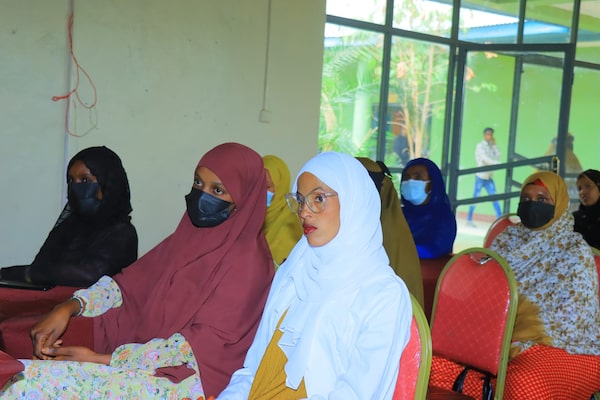
New recruits in the Eastern Ethiopian city of Jijiga, Somali region (634 km east of Addis Ababa) listen attentively to a lecture by local government officials about the benefits of the Saudi domestic work program.Supplied
Across Ethiopia, 50 state-run academic institutions have used Facebook to encourage women to abandon their studies for a career as a migrant worker in Saudi Arabia, according to data compiled by The Globe.
“The decentralized and institutional way state bodies, including the [Ethiopian] Ministry of Education, use the government’s information infrastructure to misinform, lure, and traffic young women, is downright criminal,” says Tsedale Lemma, founder of Ethiopia’s Addis Standard news magazine.
“Continuing to recruit domestic workers, while misleading them over the [kafala] system’s abolition, is tantamount to saying, ‘I do the trafficking now.’”
The Globe reached out to Ethiopia’s education and labour ministers, along with other officials in those departments, but none responded. The Globe also contacted the Saudi Arabian foreign ministry and the Saudi embassy in Canada to give them an opportunity to comment, but neither responded.
Non-payment of workers is another chronic problem for Ethiopian migrants. “There are no guarantees that migrant workers, particularly in countries with insufficient legal protections and labour laws, would receive payment,” says Miriam Karmali, a London-based human rights activist.
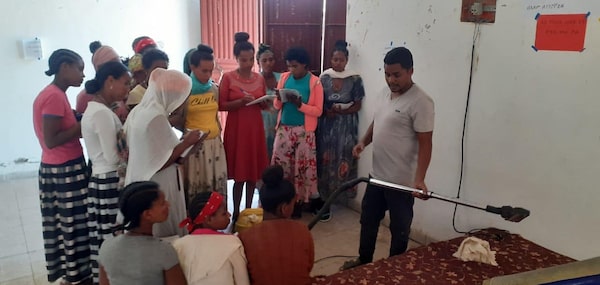
A 'teacher' showing recruits in the Amhara regional town of Addis Zemen (569 km north of the capital) how to use a vacuum. About a dozen recruits since March said that instructors were always men who themselves have never worked as domestic workers and had never set foot in the Arab world.Supplied
“They are at the mercy of employers and it’s a risk for the Ethiopian government to simply trust that workers will not be exploited. I can’t think of another example where officials are engaged in a co-ordinated push to use Facebook to send domestic workers to a country where the labour laws for migrant workers are incredibly weak.”
Ms. Sivolobova has similar concerns. “The Facebook posts will put the women in vulnerable situations, because they trust the source,” she told The Globe. “It’s shocking …. With its program, the Ethiopian government is facilitating potential human trafficking and potential forced labour in Saudi Arabia, which is grave.”
Some of the Facebook posts, including one by state-run Bishoftu College, call for recruits to pay placement fees for their jobs. Ms. Sivolobova describes them as a violation of international principles endorsed by the United Nations, which stipulate that migrant workers should incur no recruitment expenses.
Facebook’s parent company, Meta, has faced stinging criticism for its handling of human trafficking issues. In 2021, leaked internal documents revealed that Meta had failed to address the misuse of its platforms for the trafficking of domestic workers in the Middle East, despite knowing about the issue for years.
In response to questions from The Globe, a Meta spokesperson said Facebook has rules against human trafficking and it removes any such content – and the accounts behind it – whenever the company becomes aware of it.
“Human exploitation is abhorrent and not allowed on our platforms,” said Balkissa Idé Siddo, the Meta public policy director for Africa. “This includes the recruitment or facilitation of domestic servitude, including profiles of individuals to be sold as housemaids, and we take action on this content as soon as we become aware of it.”
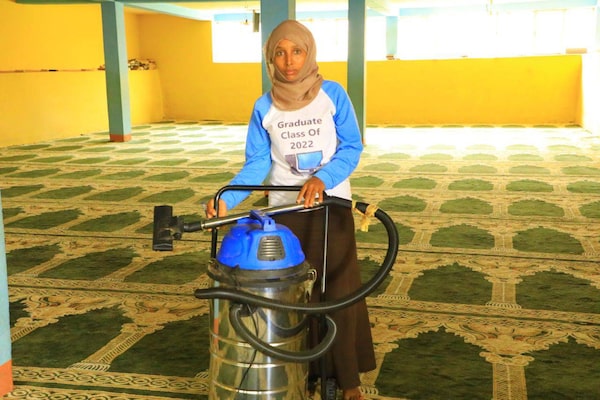
A recent graduate prepares to practice with a vacuum in the town of Tepi in Ethiopia's South West Regional State, 585 km south west of the capital. The image highlights something exhibited with many of the Facebook posts: the government has made a strenuous effort to convince college and university graduates to trade their careers at home for domestic work in Saudi Arabia.Supplied
She said Meta is constantly updating its policy on human exploitation to address new forms of human trafficking. “Because of the risk of real world harm, material relating to human exploitation is prioritized for review by our safety and security team.”
When The Globe shared some examples of the Ethiopian recruitment advertisements on Facebook, she said: “We did review a large subset, and we will take action on any posts that do violate our policies.”
In Ethiopia, Meta signed a partnership agreement last October with Ethiopia’s Ministry of Labour and Skills, the ministry leading the Saudi recruitment drive. The agreement was signed during the brutal civil war in Ethiopia, where Facebook has faced criticism for allowing hate speech posts that fuelled violence. (Meta is now facing a multibillion-dollar lawsuit.)
While Meta says the Ethiopia agreement is part of its international efforts to provide digital skills to local businesses, Labour Ministry official Nigusu Tilahun described it as an agreement to “prevent the use of Facebook by individuals who spread fake news and strive to create friction between people and government.”
When the agreement was announced at a ceremony in the Ethiopian capital, one of those in attendance was Helen Yosef Hailu, an Ethiopian who is the East Africa policy manager for Meta. Until 2019, she worked in the office of Ethiopian Prime Minister Abiy Ahmed.
Ms. Idé Siddo said Meta has formed partnerships with local organizations, not government entities, for the small-business program. Meta’s public policy managers in every region have no involvement in content moderation or content decisions, she told The Globe.